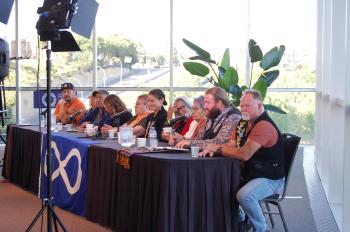Image Caption
Summary
Local Journalism Initiative Reporter
Windspeaker.com
“When (the priest) took my hand, I lost everything,” said an emotional Robert Merasty of entering Ile-a-la-Crosse residential school in Saskatchewan.
Merasty spoke to media in the evening of July 25 following the apology made by Pope Francis at Maskwacis earlier in the day. Merasty was joined by Margeret Auberchon, also a survivor of Ile-a-la-Crosse, and leaders of the Métis National Council and its four members.
They called for inclusion of residential schools that were primarily attended by Métis children.
Ile-a-la-Crosse was run by the Catholic Church from 1897 to 1995 and it received federal funding during only a part of its operation. It was primarily for Métis children and was not included in the Indian Residential School Settlement Agreement of 2006.
Merasty was one of about 180 Métis survivors from Ile-a-la-Crosse to make the trip from Saskatchewan to Alberta to hear the Pope’s apology.
Michelle LeClair, vice president of Métis Nation-Saskatchewan, said she heard words about truth, justice, healing, and reconciliation during the apology delivered by Pope Francis.
“The truth is that we have a number of unacknowledged residential schools that Métis were sent to. And that truth hasn’t been heard. And you can’t have healing without acknowledgement. And you can’t have healing without hearing those people’s stories,” she said.
“Bringing justice, healing and reconciliation to the survivors of Ile-a-la-Crosse is difficult. So we’ll take this opportunity to call the Catholic Church, the provincial government of Saskatchewan and the federal government to task.”
She said Métis in Alberta, Saskatchewan, Manitoba and parts of British Columbia and Ontario suffered the same harms as First Nations and Inuit children and it was difficult for Métis survivors to “dig deep” into the Pope’s apology without that acknowledgement.
Margaret Auberchon was seven years old when her father took her to Ile-a-la-Crosse, where she “went through hardship.” She was unable to speak English when she arrived.
For her, which level of government paid the bills for the school that was run by the Catholic Church, is not an issue.
“Reconciliation has to be for every survivor, not only the federal children, but it has to be the provincial children too,” said Auberchon.
Still, it was with a sense of wonderment that she heard the Pope’s apology, something she said she never expected to happen in her lifetime.
“The Pope…that was something,” she said.
President of the British Columbia Métis Nation Lissa Smith said she was hopeful that the Pope’s apology would begin the healing process for people.
In his apology, Pope Francis referred to his visit to Canada as a “penitential pilgrimage.”
Smith suggested that that pilgrimage began when the Indigenous delegation, which included Métis representatives, met with the Pope in the Vatican this past spring.
“It started when moccasins were left with him in Rome and he returned them,” said Smith.
The Holy Father returned the moccasins at Maskwacis, saying, “…over the past few months (these moccasins) has kept alive my sense of sorrow, indignation and shame. The memory of those children is indeed painful; it urges us to work to ensure that every child is treated with love, honour and respect. At the same time, those moccasins also speak to us of a path to follow, a journey that we desire to make together. We want to walk together, to pray together, and to work together, so that the sufferings of the past can lead to a future of justice, healing and reconciliation.”
Mitch Case, with the Métis Nation of Ontario (MNO), agreed with Smith. He attended that Vatican meeting and said the words and hearts of the survivors “moved the Holy Father and influenced his words today.”
He said the Pope’s “more fulsome” apology Monday compared to what he said in the spring, would mean something different to every survivor.
MNO chair Hank Rowlinson, who had family that attended residential schools, said he was “moved” by what he felt was a “genuine, sincere apology.”
He said some survivors he spoke to later felt this was the beginning of their healing journey.
However, Rowlinson said, he was cautious about the promises that were made and work had to be done to ensure the promises were carried through on.
In his apology, Pope Francis stated to applause, “An important part of this process will be to conduct a serious investigation into the facts of what took place in the past and to assist the survivors of the residential schools to experience healing from the traumas they suffered.”
Cassidy Caron, president of the Métis National Council, said they will continue to advocate for those who want to hear an apology in which the Pope acknowledges the role of the Catholic Church “as an institution that facilitated and perpetuated the harms to children, to communities and to the Métis Nation” and not simply the wrongs of some individuals within the Catholic Church.
Other issues that still needed to be addressed, she added, included “unfettered access” to community records held in churches and residential school records.
Local Journalism Initiative Reporters are supported by a financial contribution made by the Government of Canada.

